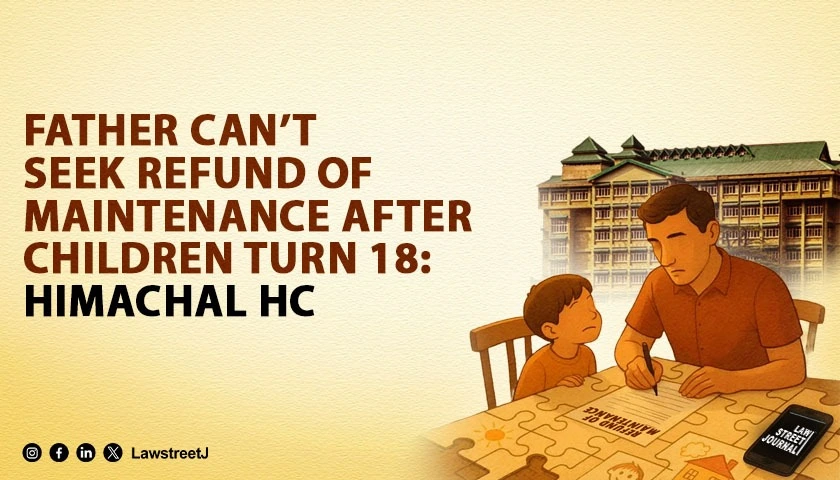Himachal: The Himachal Pradesh High Court has ruled that while a father’s legal obligation to pay maintenance ends when children attain majority, he cannot claim a refund of amounts paid thereafter, emphasizing that a moral duty toward children continues beyond statutory requirements, particularly when they are completing their education.
Justices Vivek Singh Thakur and Sushil Kukreja partly allowed a revision petition filed by two children seeking enhancement of maintenance, holding that although Section 125 CrPC does not provide for maintenance to major children, amounts voluntarily paid cannot be recovered or adjusted against other obligations.
The court addressed Cr. Revision (FC) No. 49 of 2024 filed by Rishita Kapur and Suchet Kapur challenging the dismissal of their application for enhanced maintenance by the Additional Principal Judge, Family Court, Sarkaghat, District Mandi.
The petitioners are children of respondent Vijay Kapur and proforma respondent Neelam Kumari, born on August 1, 1998, and March 17, 2002, respectively, attaining majority on August 1, 2016, and March 17, 2020. The daughter is pursuing a Ph.D. from Himachal Pradesh Krishi Vishwa Vidyalaya, Palampur, while the son is doing B.Tech from Guru Nanak Dev University, Amritsar. They claimed financial constraints were adversely affecting their studies.
Originally, the Judicial Magistrate First Class, Sarkaghat, granted ₹2,000 per month maintenance to each family member through an order dated July 9, 2012. This was enhanced to ₹3,000 per month by the Additional Sessions Judge on March 20, 2015, and further to ₹4,000 per month through Lok Adalat on July 22, 2017.
On July 2, 2018, the mother and children filed a petition under Section 127 CrPC seeking further enhancement. The Family Court enhanced the mother’s maintenance from ₹4,000 to ₹8,000 per month but dismissed the children’s enhancement claim on the grounds that they had attained majority.
The High Court examined provisions of Section 125 CrPC (now Section 144 of Bharatiya Nagarik Suraksha Sanhita), which provides maintenance for a wife unable to maintain herself, legitimate or illegitimate minor children unable to maintain themselves, and major children suffering from physical or mental abnormality or injury rendering them unable to maintain themselves.
The court observed: “From these provisions, it is apparent that a child (legitimate or illegitimate) is entitled to maintenance from the father before attaining the age of majority, and after attaining such majority, only that child (legitimate or illegitimate) shall be entitled for maintenance who, because of physical or mental abnormality or injury, is unable to maintain itself.”
The court noted that the petitioners are legitimate children not suffering any physical or mental abnormality, and therefore their legal entitlement under Section 125 CrPC ended upon attaining majority.
However, the court identified an error by the Family Court regarding the son’s claim. At the time of filing the enhancement application on July 2, 2018, the daughter had already attained majority, but the son remained a minor until March 17, 2020.
The court further held that “the Family Court committed a mistake by rejecting the claim of enhancement on behalf of petitioner No. 2 in toto, instead of from the date of attaining the age of majority. Petitioner No. 2 is entitled to the enhanced amount of maintenance at the rate of ₹8,000 from July 2, 2018, till March 17, 2020.”
The court examined other statutory provisions, noting that Section 26 of the Hindu Marriage Act, 1955, and Section 20(2) of the Hindu Adoptions and Maintenance Act, 1956, also provide maintenance only for minor children.
However, the court distinguished Section 20(3) of the Hindu Adoptions and Maintenance Act, which provides that “an unmarried daughter, unable to maintain herself out of her own earnings or property, is entitled to maintenance from her father, irrespective of her age.”
The court noted this distinction: “However, Section 125 CrPC (now Section 144 of BNSS) does not have provisions for maintenance to a major daughter, even if she is unmarried.”
The bench found no infirmity in denying maintenance to the major daughter under Section 125 CrPC but corrected the error regarding the son’s entitlement until he turned 18.
In a significant observation addressing the father’s potential claim for a refund of amounts paid after the children attained majority, the court stated: “In case respondent No. 1 has paid maintenance to petitioners No. 1 and 2 even after attaining the age of majority by them, even then, he shall not be entitled to recover the same or adjust it against maintenance payable to either of the children or proforma respondent No. 2.”
Explaining this principle, the court invoked moral obligations beyond legal duties: “Being a father, even if he has no legal duty, he has a moral obligation and duty as a father to ensure maintenance to his children, particularly when they are at the verge of completing their education, as any order to refund the amount paid in excess to the children would hamper the future prospects of the petitioners.”
The court clarified that the rejection of maintenance claims under Section 125 CrPC after attaining majority “shall not debar them from claiming their right for maintenance or otherwise in the estate of their father or predecessors-in-interest, if any, under other provisions of law.”
The father was directed to pay arrears of enhanced maintenance to the son from July 2, 2018, to March 17, 2020, by October 15, 2025, if not already paid.
Ramakant Sharma and Parav Sharma, Advocates, appeared for the petitioners, while Ashwani Pathak (Senior Advocate) with Dev Raj, Advocate, represented respondent No. 1, and Rupesh Kumar, Advocate, appeared for respondent No. 2.
Case Title: Rishita Kapur & Anr. vs. Vijay Kapur & Anr.



![Himachal HC Grants Bail to Man Accused of Unnatural Acts with Cow [READ ORDER]](/secure/uploads/2020/11/lj_8855_Himachal_Pradesh_High_Court.jpeg)
![Remaining in India after expiry of visa is offence, Himachal Pradesh HC reiterates while denying bail [Read Petition]](/secure/uploads/2023/12/lj_3841_e40384f4-2611-4a51-b179-97824c5e53c7.jpg)

![Supreme Court Stays Himachal Pradesh HC Order, Sanjay Kundu to Remain as State DGP Amid Businessman's Complaint [Read Order]](/secure/uploads/2024/01/lj_5499_5a926c6d-aa3b-4344-b54d-2c7fc5145ace.jpg)




